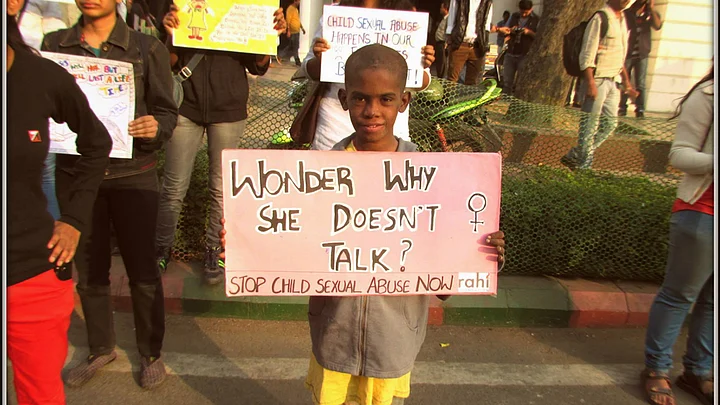(The Quint is supporting #ProtectOurChildren, an initiative by Rajeev Chandrasekhar, Member of Parliament, to find lasting solutions to the problem of Child Sexual Abuse. A group of NGOs, activists, school principals, parents and survivors of child sexual abuse are coming together for an Open House event titled ‘Why we need to start talking about Child Sexual Abuse and Protect Our Children’ on the 30th of November, at the Constitution Club of India. Participants include NGOs like HAQ Centre for Child Rights & RAHI foundation, Child Law expert Swagatha Raha from National Law School, Bengaluru, Preethi Herman from Change.org and various public figures, some of whom voice their concerns with The Quint. At the end of the deliberations, the Open House aims to arrive at a consensus to frame a roadmap and find solutions to curb the menace of Child Sexual Abuse.)
Child sexual abuse is India’s worst kept secret.
A few months ago in Delhi, a four-year-old child was led to a desolate spot by a man who was close to the family and then raped. You now know her as Choti Nirbhaya, for whom The Quint, in association with BitGiving, organised a month-long crowdfunding campaign.
Such acts not only violate a child’s body, but also the trust which is implicit in a caregiving relationship. The numbers associated with child sexual abuse are harrowing, and the secrecy surrounding the problem exacerbates the issue, given that child sexual abuse is an area of grave concern.
Woeful Lack of Research an Obstacle

Little research has been done to determine its pervasiveness. The last official study was conducted over eight years ago by the Ministry of Women and Child Development. This limited sample study reported that 53.22 per cent of children reportedly faced one or more forms of sexual abuse.
Studies conducted by civil society corroborate these stark numbers. What is more disconcerting is the fact that 50 per cent of the abusers are persons known to the child or in a position of trust and responsibility. These include the child’s immediate family members.
Tactful Handling of Disclosure of Abuse Essential

It is known, however, that the impact of child sexual abuse can be minimised if it is recognised and dealt with at an early stage. In this context, recognition of symptoms in children and adult survivors becomes a matter of great importance in healthcare and social work. In our struggle towards a just society, where the rights of women and children are protected, their sexual victimisation needs to be addressed in meaningful ways.
Responding to disclosures by child victims and adult survivors is a particularly sensitive area and a crucial component of any prevention or intervention work in the area of child sexual abuse. When disclosures do happen, those receiving such information have an opportunity to take action to stop the abuse and to help victims and survivors heal.
These responses in turn may help prevent individuals from being re-victimised. This is essential because the impact on lives of victims and survivors can be devastating if disclosures are not handled appropriately.
India Still in Denial

To draw attention to this problem, it is important to put forth evidence to substantiate our concerns. For any effective prevention and intervention work, it is necessary not only to inform but also to build capacities of people – be they social workers, teachers and legal or health professionals – to address this issue competently in their work, as well as of parents and other adults.
It is equally vital to enable young people to protect themselves and later their children. This becomes especially important in cases of survivors where helping them deal with their own abuse issues will enhance their ability to prevent it from happening to their children and break the generational abuse cycle.

But in spite of evidence indicating the prevalence and damaging consequences of child sexual abuse, there continues to be widespread denial of the extent of the problem in our country. This denial forms an obstacle to developing prevention and intervention responses, allowing such abuse to continue in our society. Child sexual abuse remains largely undetected and unaddressed, both in personal and professional settings.
It is this denial and lack of awareness which must be addressed. There is a need to speak about child sexual abuse in the open, to address the need for intervention and create avenues for victims and survivors to speak out against their abuse.
Where Do We Go From Here?

A petition started by MP Rajeev Chandrasekhar urging the Prime Minister to act against child sexual abuse has received more than 1.85 lakh signatures in a span of just two months. This indicates that awareness about child sexual abuse is increasing and that people, including politicians, are now recognising the complexity and extent of the problem.
However, this now needs to also reflect in the political agenda of the government and the justice system. This is exactly what Child Rights NGOs, women’s groups, legal experts, concerned citizens including adult survivors of such abuse, and Mr Chandrasekhar shall seek to do in the months to come.
Child sexual abuse is a complex, debilitating problem that requires a nuanced and holistic policy response. Let us hope that our collective efforts are brought to fruition, and that the government recognises the need to protect India’s 400 million children.
(Anuja Gupta is the founder of RAHI. RAHI provides adult child sexual abuse survivors with a forum for opening up about their experience with abuse.)
(At The Quint, we question everything. Play an active role in shaping our journalism by becoming a member today.)
